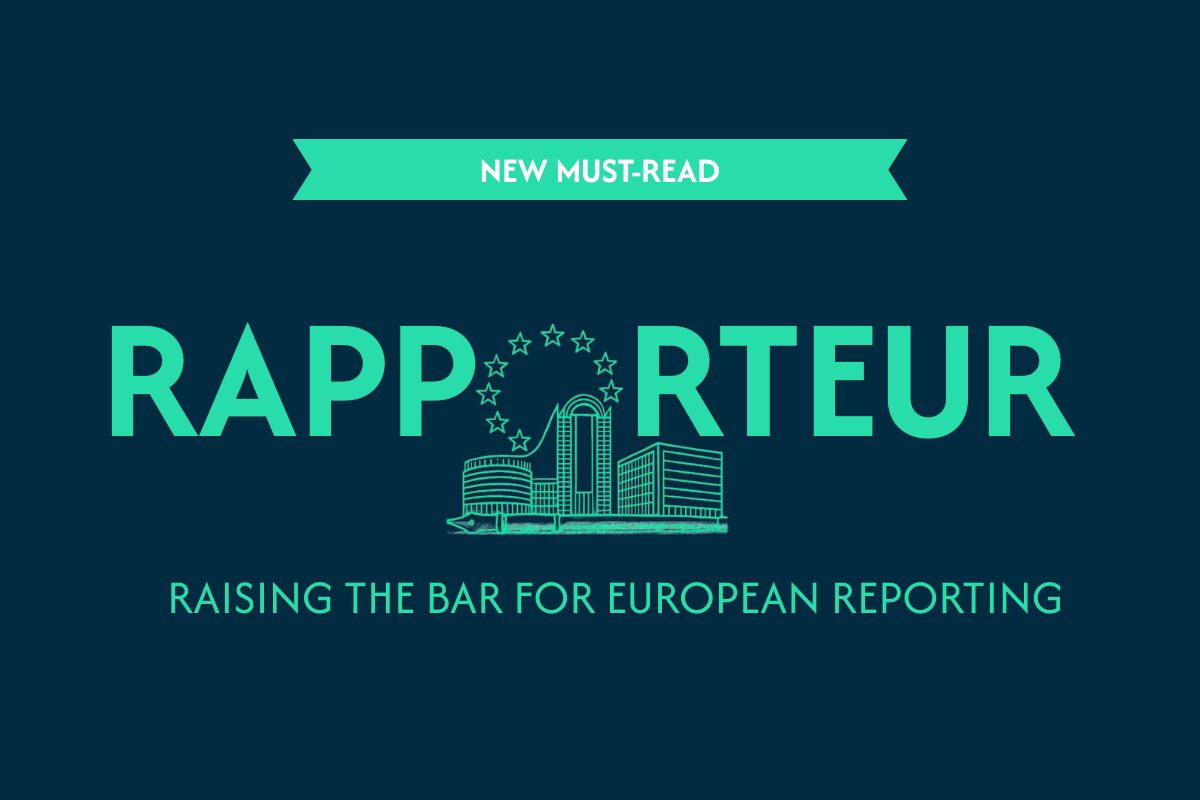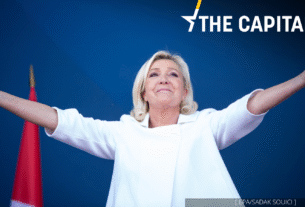Welcome to Rapporteur, our new newsletter formerly known as The Capitals. I’m Eddy Wax, joined by Nicoletta Ionta in Brussels. Each day we’ll get you up to speed on the stories shaping EU and European politics.
Need-to-knows:
- Germany: Friedrich Merz’s CDU wins, far-right AfD’s vote triples in bellwether state
- France: New PM Sébastien Lecornu says he’ll scrap his predecessor’s plan to cut two national holidays
- Belgium: PM Bart De Wever backs Israeli conductor Lahav Shani cancelled by Ghent festival
But first, we look at how a US firebrand’s assassination jolted Europe’s far right…
A message from the Euractiv Jobsite
A new and improved Jobsite!
Trusted by the Brussels bubble for over a decade, the Euractiv Jobsite is the go-to platform for careers in EU affairs. Whether you’re recruiting top talent or looking for your next opportunity, we connect institutions, NGOs, think tanks, consultancies and more across the EU job market.
Sign up here!
In the capital
Fresh from the European Parliament’s refusal to hold a minute of silence after the killing of Charlie Kirk last Thursday, populists across the bloc staged a show of unity over the weekend, piling pressure on the centre-right parties that dominate national governments.
In Germany’s North Rhine-Westphalia, Merz’s conservative CDU appears to have held off the far-right AfD, in the first major electoral test of his coalition with the Social Democrats. But the result offered little reassurance for the mainstream. The state, larger by population than 21 EU members, saw the AfD nearly triple its vote share, according to projections, placing third after a poor showing by the centre left.
Nationalist protests swept London, Madrid, and Bordeaux this weekend, where hundreds of thousands gathered to pay homage to Kirk – and revive familiar grievances: anger over Muslim immigration, government-sponsored “censorship,” and Brussels’ alleged overreach.
Populists, already in power in Italy and Hungary, are topping the polls ahead of votes in Czechia, the Netherlands, and France.
The assassination of Kirk, a conservative activist known for railing against civil rights, women’s rights, and trans rights, has injected a new zeal to their arguments. With America’s culture war rhetoric emboldening EU parties that deploy similar tactics to consolidate power, Europe’s far right is now hailing Kirk as a “martyr.”
In Madrid, Giorgia Meloni addressed a far-right party conference online, calling the murder “a reminder of where violence and intolerance truly lie.” She has invoked the killing four times, seizing on comments from left-wing figures who played it down or excused it, and casting the incident as proof of the left’s hostility to conservatives, our Rome correspondent Alessia Peretti tells me.
The Europa Viva rally was hosted by Vox, which is strictly not part of her pan-European ECR network and instead belongs to the Patriots for Europe grouping, which, incorporates the likes of Viktor Orbán, who was absent. Vox leader Santiago Abascal, in front of 8,500 people, paid tribute to Kirk and called for an end to “the caliphate of Brussels,” accusing the EU of promoting “violence by the left to destroy its rivals.”
Vox is having a sweet moment, with polls suggesting it could capture 17% of the vote in Spain’s 2027 elections – its strongest result yet – largely at the expense of the centre-right Popular Party.
In Bordeaux, the National Rally’s Marine Le Pen and Jordan Bardella launched a renewed attack on Lecornu, who began his career on the centre right. Bardella threatened to topple him if he didn’t make a political volte-face, while Le Pen reiterated her call for fresh elections.
In London, Polish ECR MEP Dominik Tarczyński marched alongside Tommy Robinson – the far-right agitator with multiple convictions, better known by his alias than his real name Stephen Yaxley-Lennon. Robinson remains too extreme even for Nigel Farage’s Reform party.
Tarczyński claimed millions had joined Robinson’s “Unite the Kingdom” protest, though Reuters put attendance at around 110,000.
Elon Musk, who had a public spat with Farage, live-streamed from the rally wearing a T-shirt that read “What would George Orwell think?” He told the crowd: “You either fight back or you die.”
The Brussels agenda is already dominated by topics once the hallmark of the far right, from slashing red tape to staunching migration.
And, as Ursula von der Leyen prepares to hold a major conference with Mario Draghi on Tuesday, one of his signature proposals to rescue Europe from its economic malaise – deeper integration – is certain to enrage populists all the more.
More Russian drones enter NATO territory
The EU struck a tough tone (with little action) this weekend, as von der Leyen and Kaja Kallas condemned the intrusion of a Russian drone into Romanian airspace. The incident came just days after 19 drones entered Poland.
This time, the drone spent close to an hour in NATO territory before heading to Ukraine. The breach occurred a day after NATO stepped up its air defences on the alliance’s eastern flank with a new operation called “Eastern Sentry.”
Trump wants Europe to sanction China
You give me tariffs, I’ll give you sanctions. Donald Trump told NATO allies he would impose “major sanctions” on Russia – but only if they slap massive tariffs on China. In a Truth Social post, he said he had sent a letter to alliance members urging levies of 50 to 100% on Beijing over its purchases of Moscow crude.
The demand, issued Saturday, landed just as US negotiators were preparing to meet Chinese counterparts in Madrid for trade talks, raising speculation it was meant as a negotiating tactic.
Still, Washington has been stepping up pressure on Europeans to target China (and India) for propping up Putin’s war machine. But unity remains elusive: Hungary and Slovakia are still deeply dependent on Russian oil, complicating any common position.
US Energy Secretary Chris Wright told Euractiv on Friday that he sees the EU’s $750 billion commitment to buy American energy as a long-term arrangement. As Nikolaus J. Kurmayer writes, Wright’s Brussels trip effectively tore up the EU’s self-declared “independence moment.”
Meanwhile, EU diplomats say the bloc’s 19th Russian sanctions package could be finalised this week, potentially including restrictions on visas for Russians entering Europe. France and Germany have also pushed to add Lukoil, Russia’s second-largest oil producer, to the blacklist. And the EU has signed off on extending individual sanctions tied to the war for another six months.
Moscow, for its part, has given little sign of relenting. Ukraine’s deputy prime minister Taras Kachka recently told Rapporteur that Russia “really puts a fork in the eye of every political leader in the world.”
The capitals
BRUSSELS
PM Bart De Wever condemned the cancellation of Israeli conductor Lahav Shani’s concert in Ghent, saying “there will never, ever be any room for racism and antisemitism in this country” after attending his performance in Germany over the weekend. Merz praised the “gesture of solidarity,” while De Wever also underlined his support for “all targeted sanctions proposed by the European Union to end the war.” With Brussels still divided over how to respond to the war in Gaza, von der Leyen has backed a partial suspension of the EU-Israel trade deal.
PARIS
Lecornu on Saturday said he would drop his predecessor François Bayrou’s plan to slash two public holidays, abandoning an austerity measure mean to curb the country’s deficit. The announcement came a day after credit rating agency Fitch cut France’s sovereign rating to A+, the lowest on record, citing political instability and adding pressure on the new PM as he races to draft a budget that can be passed by a fractured parliament. “We are paying for the instability,” Lecornu told local papers.
OSLO
Erna Solberg, Norway’s PM from 2013 to 2021, announced that she would resign as party leader of the centre-right Conservatives after 22 years at the helm. Her party lost last week’s election with just 14.6%, bleeding voters to the populist right-wing Progress Party.
MADRID
The Vuelta a España was halted on Sunday after pro-Palestinian demonstrators disrupted the race’s final stage in this capital, overturning barriers and clashing with riot police as cyclists approached the finish. Officials declared Jonas Vingegaard of Denmark the winner, but the podium ceremony was scrapped. PM Pedro Sánchez voiced support for the protesters, prompting Israel to call his government “a disgrace to Spain.” On the same day, Foreign Minister José Manuel Albares welcomed US Treasury Secretary Scott Bessent and China’s Vice Premier He Lifeng to kick off a fresh round of trade negotiations.
LONDON
The UK and US are expected to announce new agreements on technology and civil nuclear energy this week during Trump’s second state visit. PM Keir Starmer’s office said the trip will also include talks on the war in Ukraine and the finalisation of lower tariffs on steel and aluminium.
WARSAW
President Karol Nawrocki has approved the deployment of NATO troops on Polish territory under Operation “Eastern Sentry,” announced last week by NATO Secretary General Mark Rutte. The initiative, confirmed earlier by PM Donald Tusk, comes in response to the recent incursion of around 20 Russian drones into the country’s airspace.
PRAGUE
Czechia has moved to bolster Poland’s defences against Russian drone threats, sending three helicopters to reinforce airspace protection, the army said Sunday. Operations are set to begin shortly, with this capital also preparing to deploy up to 150 soldiers for a maximum of three months under an existing mandate that allows up to 2,000 Czech troops to reinforce NATO’s eastern flank.
Also on Euractiv
The German state pioneering digital sovereignty
Public administrations around the European Union are backing calls for more digital sovereignty, while defending…
5 minutes
Schleswig-Holstein, a northern German state of three million people, is moving 30,000 civil servants – a headcount roughly comparable to the European Commission – off Microsoft Office and onto open-source tools like LibreOffice, Nextcloud and Thunderbird, as part of a drive for “digital sovereignty.”
Digital minister Dirk Schrödter told Euractiv in an interview that the region is on track to cut more than two-thirds of Office licences by month’s end, though the transition has not been without hiccups – judges recently called for a return to Outlook amid outages.
The WTO exists for times like these; why not use it?
James Bacchus is professor of global affairs at the University of Central Florida and adjunct…
5 minutes

In an op-ed for Euractiv, James Bacchus, professor of global affairs at the University of Central Florida, calls Trump’s 50% tariffs on Brazil “vindictive,” arguing they are more about former President Jair Bolsonaro’s prosecution than trade.
Brasília has taken the US to the WTO, but Bacchus warns that unless other countries follow, Washington’s economic coercion will keep undermining the multilateral system building to constrain it.
Agenda
Costa meets PM Mitsotakis in Greece, President Christodoulides in Cyprus, and PM Meloni in Rome
Von der Leyen hosts a working dinner with the European Round Table for Industry
Commissioner Brunner travels to Finland and visits the Vaalimaa border crossing
Commissioner Kos meets former Commissioner Johansson, now special envoy for Ukrainians in the EU, and Albanian PM Rama
Contributors: Aurélie Pugnet, Nikolaus J. Kurmayer, Inés Fernández-Pontes, Jacob Wulff Wold, Alessia Peretti, Aleksandra Krzysztoszek, Aneta Zachová
Editors: Christina Zhao, Sofia Mandilara




